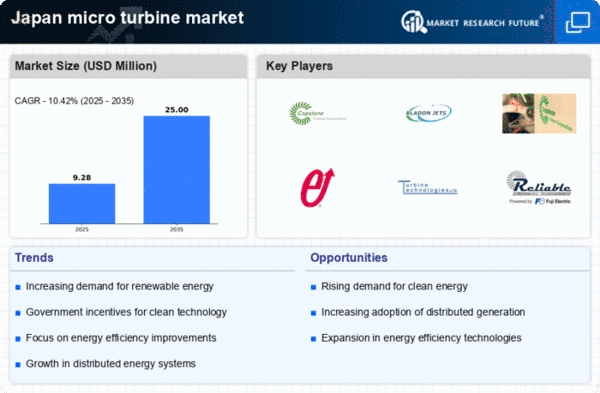Rising Environmental Awareness
There is a growing environmental awareness among consumers and businesses in Japan, which is positively impacting the micro turbine market. As the public becomes more conscious of climate change and its effects, there is an increasing demand for cleaner energy solutions. Micro turbines, known for their lower emissions compared to traditional fossil fuel generators, are becoming an attractive option. The market is likely to expand as organizations seek to meet sustainability goals and comply with stricter environmental regulations. In fact, the micro turbine market could see a growth rate of around 15% annually as more entities adopt these technologies to reduce their carbon footprint and contribute to a greener future.
Increasing Energy Security Concerns
Japan's energy security concerns are driving interest in the micro turbine market. Following the Fukushima disaster, the country has been actively seeking to diversify its energy sources and reduce reliance on imported fossil fuels. Micro turbines offer a decentralized energy generation solution that can enhance energy security by providing localized power generation. This is particularly relevant in rural areas where grid access is limited. The micro turbine market is expected to grow as businesses and households invest in these systems to ensure a reliable energy supply. The potential for micro turbines to operate on various fuels, including natural gas and biogas, further supports their role in enhancing energy security in Japan.
Government Policies Promoting Clean Energy
The Japanese government is actively promoting clean energy initiatives, which is beneficial for the micro turbine market. Policies aimed at reducing greenhouse gas emissions and increasing the share of renewable energy in the energy mix are encouraging investments in micro turbine technologies. Incentives such as subsidies and tax breaks for renewable energy projects are likely to stimulate market growth. The government has set ambitious targets to increase the share of renewables to 24% by 2030, which could lead to a substantial increase in the adoption of micro turbines. This supportive regulatory environment is expected to create a favorable landscape for the micro turbine market, attracting both domestic and international players.
Technological Advancements in Micro Turbines
The micro turbine market in Japan is experiencing a surge due to rapid technological advancements. Innovations in turbine design and materials have led to increased efficiency and reduced operational costs. For instance, the latest micro turbines can achieve efficiencies exceeding 30%, making them a viable option for both residential and commercial applications. Furthermore, advancements in control systems and integration with smart grid technologies enhance the operational flexibility of micro turbines. This technological evolution not only improves performance but also aligns with Japan's energy policies aimed at reducing carbon emissions. As a result, the micro turbine market is likely to see a significant uptick in adoption rates, driven by both technological improvements and the need for sustainable energy solutions.
Growing Demand for Combined Heat and Power Systems
The demand for combined heat and power (CHP) systems in Japan is contributing to the growth of the micro turbine market. CHP systems, which generate electricity and useful heat simultaneously, are becoming increasingly popular in industrial and commercial sectors. Micro turbines are well-suited for CHP applications due to their compact size and ability to operate efficiently at varying loads. The market for micro turbines is projected to expand as businesses seek to improve energy efficiency and reduce operational costs. With rising energy prices and the need for reliable power sources, the micro turbine market is likely to benefit from the growing trend towards CHP systems, potentially increasing its market share in the energy sector.
















